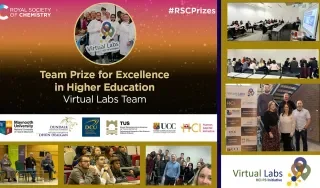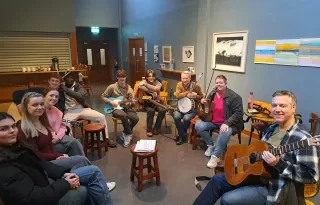Virtual Labs Team wins prestigious Royal Society of Chemistry prize for transforming the future of laboratory learning
A tech-driven team using immersive digital labs to reinvent practical science and prepare students for future industry has been honoured with a major Royal Society of Chemistry (RSC) award.
The Virtual Labs Team has been the RSC’s Team Prize for Excellence in Higher Education in honour of their collaborative work that is helping students build more confidence about participating in hands-on lab work
After selecting them as one of nine Excellence in Education Prize winners this year, the RSC credited the team ‘for their cross-institution collaboration to integrate virtual labs aimed at enhancing the laboratory experience and preparing students for the industry of the future.’

The group is made up of 10 researchers from Dundalk Institute of Technology, Maynooth University, University College Cork, the Technological University of the Shannon and Dublin City University . Together, they focus on the use of virtual laboratories as a teaching tool for the chemical sciences and puts student partnership at the centre of their approach.
By working with enterprise partners and education technology providers, students ranging from first-year undergraduates to master’s-level researchers have had a chance to try a new way of learning. The project started in 2020 and is due to reach the end of its lifetime next year.
In recognition of their efforts, the team will receive £3,000, a team trophy, a certificate and token of recognition for each team member, as well as joining an illustrious body of prize winners. A total of 60 Nobel Prize laureates count among previous winners of RSC awards over the 150 years in which the learned society has honoured scientific excellence.
In a statement, the team said: “It is a huge honour to have been awarded the 2025 Team Prize for Excellence in Higher Education. It is a significant recognition of our shared commitment to excellence in laboratory education and highlights the strength of our collaboration and of working together across roles, disciplines, and institutions.
“It confirms the importance of having a community of practice where ideas are shared and innovation can thrive. Our team is proud to be contributing to a wider movement in laboratory education that embraces innovation, inclusivity, and evidence-based, digitally enhanced laboratory learning.
We hope that, by receiving this award we will inspire others to work collaboratively across institutions to support and enhance their students’ education.”
The team's goal is to determine and implement the most effective strategies to enhance laboratory education in ways that best prepare students to embark on future careers in STEM.
While laboratory education is a very significant component of an experimental science curriculum, the laboratory remains a complex learning. In an environment where laboratory teaching is often constrained in terms of both time and space, educators are challenged to find the best way to provide a quality experience for the modern student which embeds transversal skills alongside developing experimental competencies.
A blended approach to laboratory education has obvious advantages in terms of accessibility, and inclusivity was a key priority for our team. Students can complete pre- and post-lab simulations at a time and place that suits their own schedule.
“The team is made up of staff from different institutions, disciplines, genders, and career stages, and we’re learning so much from each other. It’s a rare kind of collaboration in laboratory science, and it’s changing how we teach,” said Project Lead Professor Denise Rooney, of Maynooth University.
Dr Helen Pain, Chief Executive of the Royal Society of Chemistry, added: “The chemical sciences are at the forefront of tackling a range of challenges facing our world. From fundamental chemistry to cutting-edge innovations, the work that chemical scientists do has an important role to play in building our future.
“The inspiration, innovation and dedication of those who work in education is fundamental to the progress of the chemical sciences – shaping the future and setting our young people up to tackle the challenges and the opportunities facing our society and our planet.
“The team’s work demonstrates an outstanding commitment to chemistry education, and it is our honour to celebrate their considerable contribution.”
The Excellence in Education Prizes celebrate inspirational, innovative, and dedicated people working in primary, secondary, further education and higher education – including teachers, technicians and more. These prizes recognise a wide range of skills – from curriculum design to effective teaching, and from personal development to working culture. This category includes specific prizes for teams and for those in the early stages of their career.
For more information about the RSC’s prizes portfolio, visit rsc.li/prizes.
ENDS
Rewarding Excellence and Gaining Recognition
The Royal Society of Chemistry’s prizes portfolio is one of the oldest and most prestigious in the world, recognising achievements by individuals, teams and organisations in advancing the chemical sciences. We reward those undertaking excellent work in the chemical sciences from across the world.
More information is available at: rsc.li/prizes.
About the Royal Society of Chemistry
The Royal Society of Chemistry works at the heart of the chemical sciences community to create a future that is more open, more green, and more equal. As an independent catalyst for change, we connect people and ideas through partnerships, conferences, events and networks that span the globe. We care about protecting our natural environment, about tackling discrimination to build a truly inclusive world, and about making cutting-edge chemistry accessible wherever it’s needed for the good of society. It’s all built upon and lifted up by our diverse global membership, with every one of those 60,000 members bringing a unique and valuable perspective.



